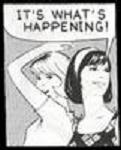What's Happening?
From Santa Fe Institute Events Wiki
Team Awesome: Sarah Wise, Lynette Shaw, Ingrid van Putten, Micael Ehn and John Paul Gonzales

How do we come to understand the world?
The world is not a self-evident place. All information we receive from the environment requires us to make inferences, to ascribe meaning to, what has happened. There is a firmly established body of research in human cognition that says these interpretations of “what is happening” arise from a set of unseen background assumptions we automatically and unconsciously impose on the situations in which we find ourselves. It is these assumption sets which drive the values, opinions, attitudes, and behaviors of which we are consciously aware.
This basic idea has reoccurred throughout the history of the social sciences under many names: “mental representations,” “categories,” “mental models,” “schemas,” “scripts,” “conceptual metaphors,” “frames,” and uncounted others. Furthermore, the notion that there exist collectively held frameworks of meaning has been the cornerstone of many prominent theories and is the essential idea underlying any conceptualization of a “socially constructed reality.”
But how do these frameworks of meaning come to be shared across a group? How is it that we come to a collectively held understanding of “what is happening” in a given social circumstance?
This project begins with a model of how humans automatically and unconsciously use social information feedbacks in order to settle upon what framework they will impose upon the situation they are in. Though this core model is strongly based in established cognitive science work, it is extremely simple.
The goal of this project is to use agent-based modeling to demonstrate how this parsimonious model of individual cognition can lead to interesting and empirically supported understandings of how the social world operates. Furthermore, it will begin exploring different ways simulations can be parameterized to in order to build more elaborate models that have long been of interest to a wide diversity of social researchers.
Comments
Cool stuff. Will the agents enter a specific context and then, depending on their cognitive makeup, decide what is going on? Will they be able to transfer meaning? Andreas
Literature
March, J. G. Exploration and Exploitation in Organizational Learning Organization Science, 1991, 2, 71-87
- Abstract: This paper considers the relation between the exploration of new possibilities and the exploitation of old certainties in organizational learning. It examines some complications in allocating resources between the two, particularly those introduced by the distribution of costs and benefits across time and space, and the effects of ecological interaction. Two general situations involving the development and use of knowledge in organizations are modeled. The first is the case of mutual learning between members of an organization and an organizational code. The second is the case of learning and competitive advantage in competition for primacy. The paper develops an argument that adaptive processes, by refining exploitation more rapidly than exploration, are likely to become effective in the short run but self-destructive in the long run. The possibility that certain common organizational practices ameliorate that tendency is assessed.
Review:
- AL: interesting paper and elegant way of modelling socialisation of employees in a company in an environment.
- Exploration includes things captured by terms such as search, variation, risk taking, experimentation, play, flexibility, discovery, innovation. Exploitation includes such things as refinement, choice, production, efficiency, selection, implementation, execution. Adaptive systems that engage in exploration to the exclusion of exploitation are likely to find that they suffer the costs of experimentation without gaining many of its benefits.
- Information about the distribution is accumulated over time, but choices must be made between gaining new information about alternatives and thus improving future returns (which suggests allocating part of the investment to searching among uncertain alternatives), and using the information currently available to improve present returns (which suggests concentrating the investment on the apparently best alternative).
- It is quite possible for competence in an inferior activity to become great enough to exclude superior activities with which an organization has little experience (AL: lock-in).
- there might be some advantage to having a mix of fast and slow learners in an organization.
- Exogenous environmental change makes adaptation essential, but it also makes learning from experience difficult.
- Turnover is useful in the face of turbulence, but it produces a disparity between code knowledge and the average knowledge of individuals in the organization.
- The distance in time and space between the locus of learning and the locus for the realization of returns is generally greater in the case of exploration than in the case of exploitation, as is the uncertainty.
